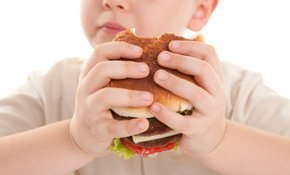Over 90% Britons say parents should be responsible for dealing with obesity in children & teenagers
Who would you say is responsible for obesity in children?
Our poll on the topic revealed there is a very strong consensus among Britons that the parents of an obese child should be responsible for dealing with their weight problem.
Half feel a child under the age of 13 should also take on the responsibility to regain their health, while just over a quarter think schools should also be responsible, and one in five feels the responsibility to deal with a child's weight problem lies with the NHS.
- 94% think parents should be responsible for dealing with their child's weight problem
- 50% think the child themselves should be responsible for dealing with the weight
- 27% think schools should be responsible
- 22% think the local authority and social services should bear some responsibility
- 21% think the NHS is responsible for dealing with a child’s obesity
What about teenagers?
When considering dealing with teenagers who are extremely overweight, British people still say that parents should take on responsibility, but perhaps predictably, many more felt that the teenager themselves should take on almost equal responsibility for maintaining a healthy weight. Again, around one in five thought schools and the NHS should also be accountable for dealing with a teenager’s weight problem.
- 91% think it is the responsibility of their parents to deal with a teenager's weight problems
- 79% think it is the responsibility of the teenager themselves to deal with their weight problems
- 28% believe schools are responsible
- 23% said the NHS is responsible
- 22% put responsibility with the local authority and social services
Currently, almost a third of children aged 2 to 15 years of age are overweight or obese – while for adults age 16 or over, the figures soars to 62.8%, according to 2010 Health Survey for England (HSE) data from the Department of Health.
The big issue
Unsurprisingly, the issue of childhood eating habits have been on the public and political agenda in recent years.
The NHS itself encourages a dual-pronged approach in which families and parents, as well as schools, are responsible for addressing a child's weight if it becomes a problem, while NHS campaign Change4Life encourages families to eat more healthily and move around more, and provides tips and recipes for families wanting to become 'healthier and happier'.
Another high-profile attempt to address the problem is TV chef Jamie Oliver’s ‘Feed Me Better’ campaign. The movement ‒ which has sparked support, as well as opposition and controversy since its inception ‒ aims to work with the Government, education authorities and parents to help get healthier food into Britain’s schools.
After filming his 2005 series School Dinners, Oliver discovered that many children consume too much sugar, salt and fat, eat at best only two portions of fruit and veg each day, and are often dependent on school lunches for their main meal of the day.
"A healthy school meal improves a child’s ability to learn," the chef and father-of-four has said in defence of his campaign. “We must continue to feed our children better... We must invest in our kids; they are the future and they deserve it."
Aiming to highlight the dangers of childhood obesity, and encouraging families and schools in ways they can help, National Childhood Obesity Week (1st-7th July) will be focusing on raising awareness on what is appropriate and healthy.










